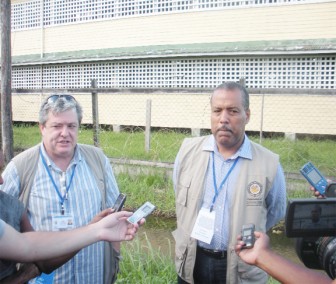Head of the Organisation of American States (OAS) Observer Mission Professor Gordon Shirley is hopeful that voter numbers at the 2011 general and regional elections could reach record numbers and is pleased with the eagerness shown among the electorate, half of which is estimated to have voted by midday yesterday.
Shirley, together with media liaison John Enright, held a press conference outside the East Ruimveldt Secondary School polling station yesterday.
Asked what he estimates the turnout to be by the end of poll, Professor Shirley said, “I wouldn’t want to give you a definitive percentage but what we know is that up to 13:00 hrs, at the [polling stations] that we were at, I would say that more than 50 percent of the votes had been cast at that point in time. This is true for many of the stations visited by our observers.”

Asked if the OAS team heard about the concerns over tendered ballots, he said he is aware of one instance, “and we understand that that was addressed by the Chairman of GECOM at his press conference.”
“Let me begin by saying that the OAS has been pleased to be able to field a team of about 25 persons who have visited over ten percent of the polling stations in nine of the 10 districts as at [13:00 hrs] today (yesterday) and their visits continue. A small team, including the deputy chief of mission, the political adviser to the [OAS] Secretary General and myself has visited about a dozen polling stations in three districts. We were able to see the opening of several of these stations and to see the turnout that has occurred,” he said.
“We are very pleased to say that everything seems to have been going quite well. The turnout has been quite large and it has been a peaceful process,” he said.
In terms of late opening of polling stations, Professor Shirley said that the mission did hear of one instance where this occurred. “In this instance it was because the material had not been delivered from Georgetown. By the time we got there at about 07:30 hrs, the materials had already come. There was a very long line of voters. But I am very pleased to say that the spirit with which the voters have gone to the polls really is quite impressive. They waited in an orderly fashion, in a line, and as soon as the polls opened they were processed and they processed along their way and this is what we have seen at all the polling stations where we have visited,” Professor Shirley said.
He noted that people seemed eager to go to the polls, but he noted a few instances where persons came to the polling stations and were unable to find their names on the list. “There appears to have been a little bit of confusion as to how to deal with those instances. They were sent to adjoining polling stations but we saw a few instances where they came back because they couldn’t find (their names) at those stations either. We know that GECOM has a hotline and that persons ought to be calling that hotline,” he said.
He spoke of some changes that have occurred to the polling stations recently “but I don’t know of any increasing of the number of polling stations. GECOM has had to change the location of a polling station for one reason or another.”
He encouraged persons who would have not yet cast their ballot to do so. “It is our sense, based on what we have seen that there is ample security in place at the polling stations. We think that the conditions are such that it would warrant them coming out to complete the polling process and we hope that we will have a very high turnout rate, possibly a record number voting at these elections,” he said.
Pressed by journalists as to whether he believes the elections were free and fair, his response was, “we think that things have gone very well today…we think that things have gone well…we think that free elections are in progress.”
Speaking to the Stabroek News, Henrique Neves, the chief of mission of the contingent of observers from the Union of South American Nations (UNASUR), said that at about midday yesterday things were going well. He said that at the beginning of the process, there were complaints about crowds but things had calmed down since. “Nobody said anything to us about difficulties and things like that,” said Neves.
Asked whether he was satisfied with the mechanisms put in place by GECOM for the elections, Neves said that it was not for the observer mission to make an assessment of how satisfactory the mechanisms were, but to observe the conduct of the elections. “We are not to say it is good or it is not. We are just to observe, and what we observed is that everything was going right,” he said. He said that the team will make a report at the end of the elections and this will be presented today.
Neves said that the UNASUR observer mission is not working along with any other observer mission but is operating independently. UNASUR has a team of nine persons divided into three teams of three. The teams monitored polling activity in Georgetown, Parika and Linden.




